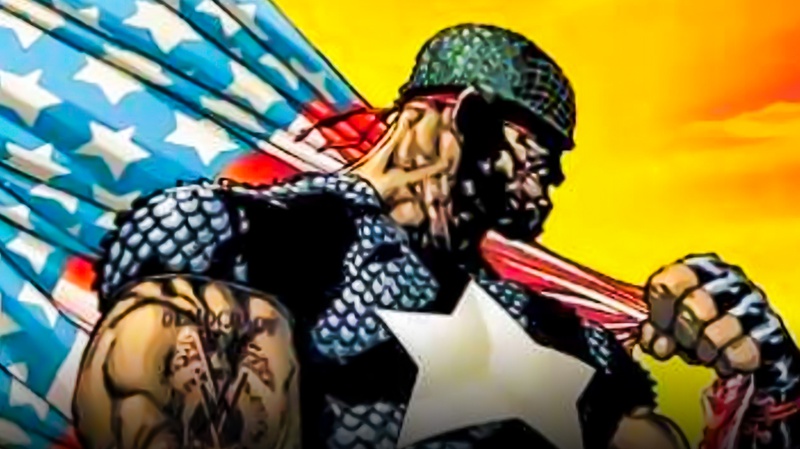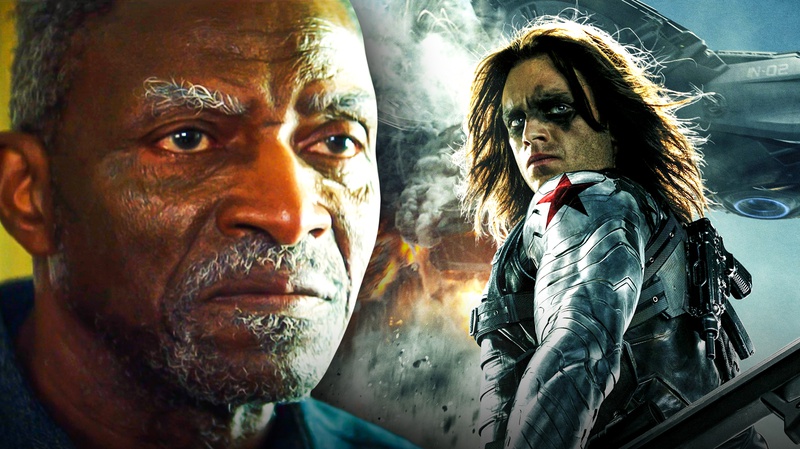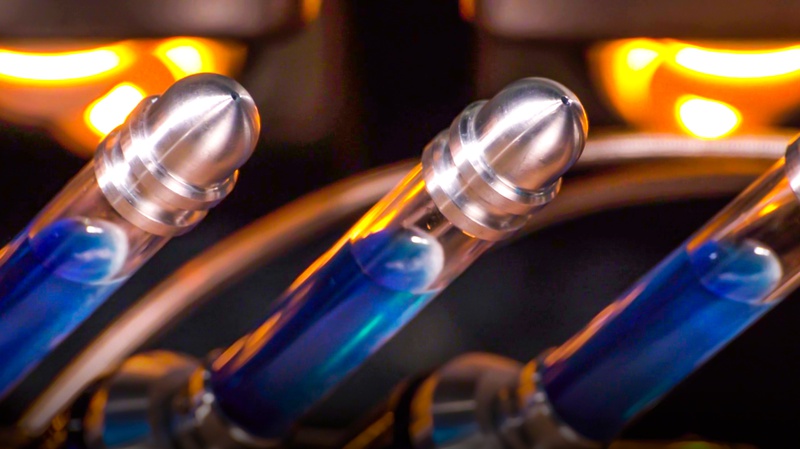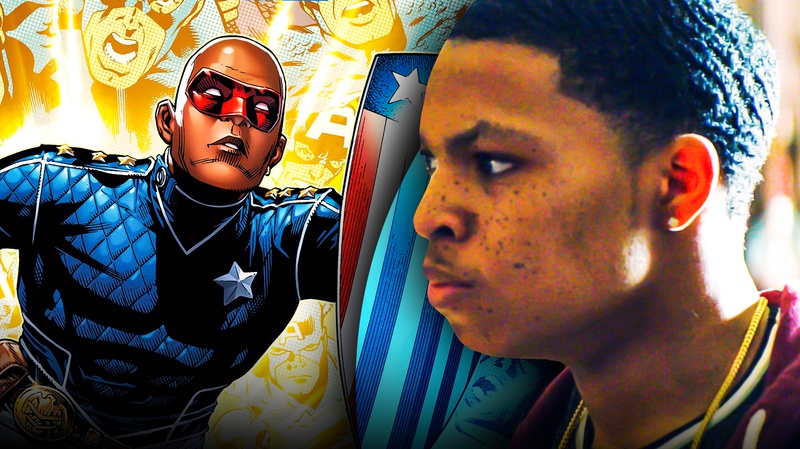
WARNING: This article contains spoilers for "Episode 2" of The Falcon and the Winter Soldier.
When Steve Rogers went into the ice in 1945, the world lost its first and only super soldier. Despite this topic going largely unacknowledged in the MCU outside the star-spangled man’s stand-alone franchise, the world tried many times to recreate what Rogers became and accomplished.
Efforts like this came from anyone from Howard Stark to HYDRA, but what hasn’t been discussed is how the US government continued their research following the death of Dr. Abraham Erskine and the disappearance of Captain America. The closest fans have gotten to an answer in that arena was in 2008’s The Incredible Hulk when General Thaddeus Ross administered a strain of the super soldier serum to Emil Blonsky, which audiences quickly noticed was a less-than-perfect concoction.
After contributing to Blonsky’s transformation into the brutally hideous Abomination, Ross seemed to put this project on ice as well, leaving the conversation on the table of just how long and hard the United States had worked to replicate the super soldier formula. So other than Howard Stark’s unexplained research with the super soldier serum in the 90s, this was really the only time fans got to see how much the United States invested in their search to recreate the drug that gave the world its first perfect soldier.
That is, until “Episode 2” of The Falcon and the Winter Soldier debuted on Disney+. As it turns out, the United States government continued their research on the Super Soldier Serum almost immediately after losing Steve Rogers, but not in the same voluntary manner that was led by Dr. Erskine during World War II. Instead, audiences were introduced to a survivor of the US’ unchecked experiments and endeavors following the loss of Captain America. His name is Isaiah Bradley, and he claims the super soldier serum was a curse on his life.
ISAIAH BRADLEY COMIC BACKSTORY

Isaiah Bradley was once known as “Black Captain America” in Marvel Comics, which was teased in the moments leading up to his MCU debut when a kid on the streets of Baltimore refers to Sam Wilson as “Black Falcon.”
Bradley was one of three hundred black soldiers used as test subjects in Project Rebirth — an attempt to recreate Captain America’s Super Soldier Serum. The experiments on Bradley were a success, but sadly the same could not be said for any others that were subjected to these tests.
As the sole survivor, Bradley would later take up the mantle of Captain America in Steve Rogers’ absence as he fought for his country overseas — a decision of which the US government did not approve. As a result, Bradley was sentenced to life in prison for his “treasonous” acts, although he was released about twenty years later. The US never allowed Bradley’s legacy to become that of the original Captain America’s, but he remained a hero to the Black community.
CAPTAIN AMERICA AND THE KOREAN WAR

One of the focal points of The Falcon and the Winter Soldier is the question of who will carry the mantle of Captain America now that Steve Rogers is gone. And while fans have to decide whether they like John Walker as the new Cap or want to see Sam Wilson take the shield back for himself, audiences were also introduced to a man that was in this conversation the first time it was had when Steve Rogers went missing in 1945.
Bucky has been trying to convince Sam that he made a mistake by giving up the shield that Steve Rogers passed down to him, and he thought that introducing Sam to Isaiah Bradley would help him rethink that decision. Bucky clearly made the right call here as Sam was more than shaken up about this revelation that “there was a Black super soldier decades ago and nobody knew about it.”
It’s truly a tragic story. In the US’ first world conflict since losing Steve Rogers, Isaiah explained that he was tasked with tracking down the Winter Soldier during the Korean War after the States had found little success in doing so. He claimed to have taken half of Bucky’s metal arm when he found him, but obviously, he was ultimately unsuccessful in his mission.
The likely story here is that the US denied any involvement in this operation since Bradley had ultimately failed them, which is probably what led to him being brought back home and locked up by the very country that set him on this path. So, despite Bradley’s efforts of being the hero that he was quite literally made to be as “one of the ones that HYDRA feared the most — like Steve,” Isaiah found himself on the side of the United States that would never make it to the pages of a history book.
THE SEARCH FOR THE SERUM CONTINUES

“You know what they did to me for being a hero? They put my ass in jail for thirty years. People running tests, taking my blood, coming into my cell. Even your people weren’t done with me.”
-Isaiah Bradley, The Falcon and the Winter Soldier
There’s no telling just how much of Isaiah’s time in the military was voluntary. And if that wasn’t enough already, he went on to add that the US didn’t back down from their work on the Super Soldier Serum following these events, but rather continued their experiments and violated his human rights by using him as a test subject during his thirty-year imprisonment.
Bucky mentioned that he met Isaiah in 1951. If Isaiah was imprisoned shortly thereafter, then he would have been subjected to these experiments until the early 1980s. Isaiah Bradley may have been the only super soldier to follow in Captain America's footsteps, but there were also others with different intentions in mind that discovered a version of the Super Soldier Serum themselves.
If HYDRA was able to infiltrate SHIELD's ranks all the way back in 1945 when Steve Rogers was first injected with the serum, then there's reason to believe they were able to do the same following WWII and the disappearance of Captain America. This could be the connection needed to help explain the origins of characters like Red Guardian — the Soviet Union’s answer to Captain America that will be introduced and explored in 2021’s Black Widow.
Isaiah also mentioned that “even (Bucky’s) people weren’t done with” him. Bucky later clarified that Isaiah was referring to HYDRA when he said this. Since HYDRA was considered all but dismantled until the mid-2010s, Bradley was likely referring to the time that the organization operated secretly within SHIELD.
This notion could even connect Isaiah Bradley to Howard Stark’s work on the serum in the early 90s that was alluded to in Captain America: Civil War. Whether Stark knew about Isaiah Bradley is a different story, but there’s truly no telling what else Bradley endured before he found his quiet life in Baltimore. With all this in mind, Bradley could have been the hidden answer to several super soldier successes over the years.
THE LEGACY OF CAPTAIN AMERICA
Bucky electing not to tell Steve Rogers about Isaiah Bradley is pretty ironic, considering keeping secrets that he shouldn’t have been was one of Cap’s biggest flaws throughout his MCU tenure. But Bucky made it clear that Isaiah “had already been through enough,” and after decades of torture and misery and Isaiah’s refusal to even speak with Sam at all, it’s clear that the old soldier would rather live out his days undisturbed.
Although never mentioned by name, Isaiah’s assumed grandson Eli was the one that answered the door and kept Sam and Bucky from entering. He didn’t seem fazed that two Avengers were standing in front of him, nor did he care how badly they wanted to meet with his grandfather. He also escorted them out of the house once Isaiah had heard enough, further establishing Eli’s place as the protector of the home.

Eli Bradley’s inclusion is particularly exciting to see as he is already grown to his late teens — possibly even in his twenties — and displays a purposefully hardened exterior. He carries himself with strength and composure, not unlike many current MCU heroes. As fans of Marvel Comics know, Eli Bradley takes up the Patriot alias and joins the Young Avengers.
Interestingly enough, the first installment in the MCU's Phase 4 WandaVision took viewers on a family journey with Wanda Maximoff as she gave birth to twin boys who inherited the abilities of hers and her brother's. It would be especially exciting if Eli Bradley were to inherit super-soldier-like abilities from his grandfather. Phase 4 has placed a big focus on legacy; perhaps Eli Bradley's inclusion in this scene is another seed planted with that same intent.
Speaking of legacy, though, it's the legacy of Captain America that stays at center stage in The Falcon and the Winter Soldier. Sam Wilson is going to have to make a choice of whether he's going to accept what's happened, or if he's going to fight to make a change for the better. Immediately following his encounter with Isaiah Bradley and hearing about the cruel reality he had to live through, Sam is racially profiled by the Baltimore Police for nothing more than a shouting match with Bucky.
Putting these two events back-to-back speaks volumes to the direction of Sam's character in this series, as he's surely found a new motivation to restore the mantle of Captain America that was passed to him. The weight of this sequence is one of the heaviest in any MCU installment, and Sam will certainly carry it through the rest of The Falcon and the Winter Soldier. The introduction of Isaiah Bradley could be just what Sam Wilson needs to realize his new sense of duty — that he is the next Captain America.












